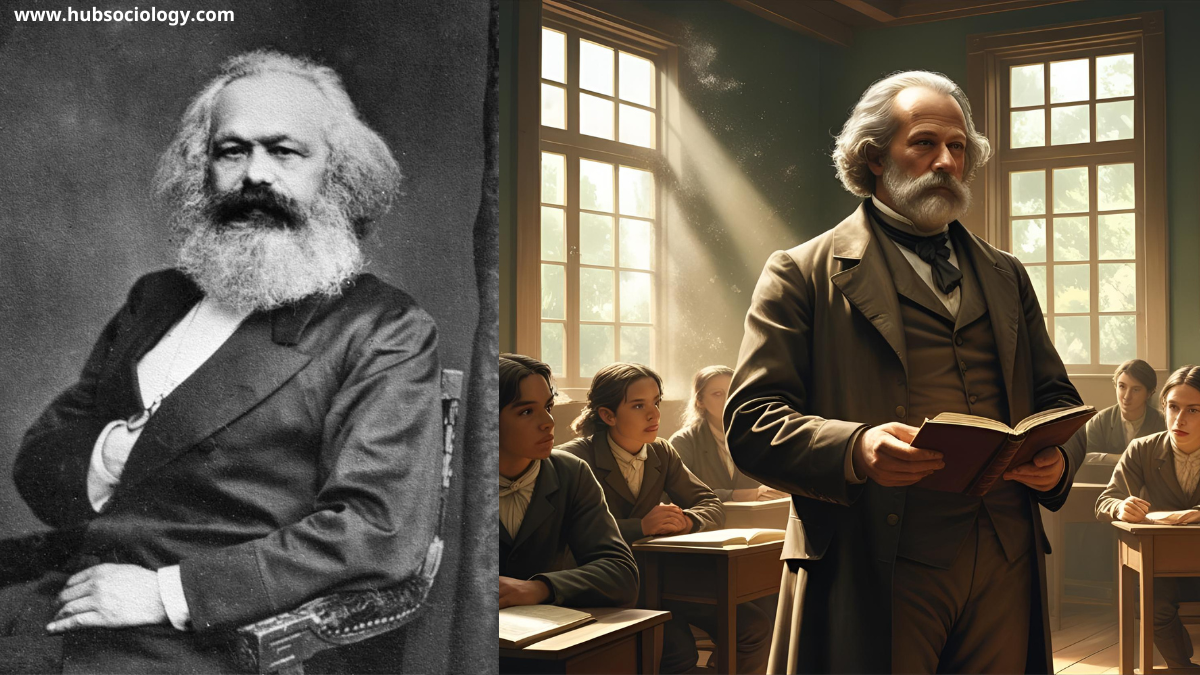Introduction on Karl Marx Contributions to Sociology
Karl Marx (1818–1883) is still regarded as one of the most important figures in political philosophy, economics, and sociology. His critiques of capitalism, theories of class struggle, and analysis of social structures have profoundly shaped sociological thought. Marx’s work provides a framework for understanding how economic systems shape social relations, power dynamics, and historical change. This article explores Marx’s key contributions to sociology, focusing on his theories of class, capital, and conflict, and their enduring relevance in contemporary sociological analysis.
1. Historical Materialism: The Foundation of Karl Marx Sociology
Marx’s sociological perspective is rooted in historical materialism, which asserts that material conditions—particularly the means of production—determine the structure and development of society. Unlike idealist philosophers who saw ideas as the driving force of history, Marx argued that economic relations form the base of society, while political, legal, and cultural institutions constitute the superstructure.
Key Aspects of Historical Materialism:
- Mode of Production: The way societies organize production (e.g., feudalism, capitalism) shapes their social relations.
- Dialectical Change: Societies evolve through contradictions and conflicts between classes.
- Alienation: Under capitalism, workers are alienated from their labor, products, and humanity.
Historical materialism provides a sociological lens to analyze how economic systems influence social hierarchies, ideologies, and revolutions.
2. Class Struggle: The Engine of Social Change
Karl Marx most famous contribution to sociology is his theory of class struggle, articulated in The Communist Manifesto (1848) with Friedrich Engels. He argued that history is a series of conflicts between oppressor and oppressed classes.

Marx’s Class Theory:
- Bourgeoisie: Owners of the means of production (factories, land, and capital) are known as bourgeoisie.
- Proletariat : Workers, or the proletariat, sell their labor for pay but do not own the goods they produce.
- Class Consciousness: Workers must recognize their exploitation to unite and overthrow capitalism.
Karl Marx predicted that capitalism’s inherent inequalities would lead to a proletarian revolution, establishing a classless, communist society.
Relevance in Modern Sociology:
- Income Inequality: Marx’s ideas help explain wealth disparities in capitalist societies.
- Labor Exploitation: Sociologists study precarious work, gig economies, and wage stagnation through Marx’s lens.
- False Consciousness: The media and ideology may prevent workers from recognizing exploitation.
3. Capitalism and Its Contradictions
Marx’s Das Kapital (1867) dissects capitalism’s structural flaws, emphasizing how it generates inequality and crisis.

Key Concepts in Marx’s Critique of Capitalism:
- Commodity Fetishism: Social relations are obscured by the focus on goods and money.
- Surplus Value: When workers are paid less than the value they generate, capitalists make money.
- Crisis of Overproduction: Capitalism’s drive for profit leads to economic crashes.
Sociological Implications:
- Globalization: Marx’s ideas apply to multinational corporations exploiting cheap labor.
- Consumer Culture: Commodity fetishism explains modern consumerism and branding.
- Financial Crises: The 2008 recession reflects Marx’s predictions about capitalist instability.
4. Conflict Theory: Marx’s Legacy in Sociology
Karl Marx focus on power clashes served as the foundation for conflict theory, a significant paradigm in sociology.
Conflict Theory vs. Functionalism:
- Functionalism (Durkheim, Parsons): Views society as a stable system where institutions maintain order.
- Conflict Theory (Marx, Weber, Mills): Sees society as a battleground of competing interests.
Modern Applications of Conflict Theory:
- Race & Gender: Intersectional theorists (e.g., Patricia Hill Collins) expand Marx’s class analysis to include race, gender, and colonialism.
- Political Sociology: Examines how elites maintain power through ideology (e.g., media, education).
- Social Movements: Marxian ideals are reflected in demonstrations against economic inequality, such as labor strikes and Occupy Wall Street.
5. Criticisms and Contemporary Relevance
Marx’s theories have been criticized even if they are still widely accepted:
Criticisms of Marx’s Sociology:
- Economic Determinism: Overemphasizes economics, neglecting culture and agency.
- Failed Revolutions: Communist states often became authoritarian, diverging from Marx’s vision.
- Class Reductionism: Ignores other forms of oppression (race, gender).
Why Marx Still Matters in Sociology:
- Neo-Marxism: Scholars like Antonio Gramsci (hegemony) and Louis Althusser (ideological state apparatuses) updated Marx’s ideas.
- Digital Capitalism: Tech giants (Amazon, Uber) exemplify new forms of exploitation.
- Climate Crisis: Marx’s critique of endless growth resonates with ecological Marxism.
Conclusion on Karl Marx Contributions to Sociology

Karl Marx’s contributions to sociology—class analysis, historical materialism, and conflict theory—provide essential tools for understanding power, inequality, and social change. While his predictions about revolution have not fully materialized, his insights into capitalism’s exploitative nature remain strikingly relevant. Modern sociologists continue to draw on Marx’s framework to analyze globalization, labor exploitation, and systemic oppression. As long as economic inequalities persist, Karl Marx sociological legacy will endure, challenging us to envision a more just society.
Do you like this this Article ? You Can follow as on :-
Facebook – https://www.facebook.com/hubsociology
Whatsapp Channel – https://whatsapp.com/channel/0029Vb6D8vGKWEKpJpu5QP0O
Gmail – hubsociology@gmail.com

3 thoughts on “Karl Marx Contributions to Sociology: Class, Capital, and Conflict”